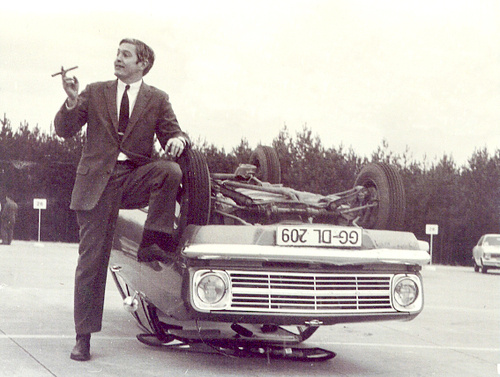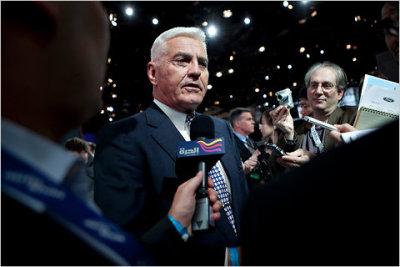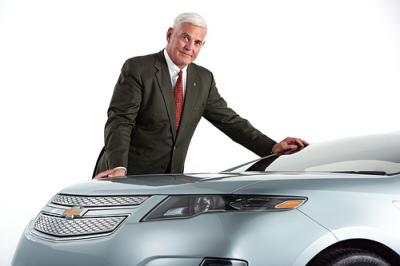Book Review: Bob Lutz's "Car Guys vs. Bean Counters"
 Saturday, August 13, 2011 at 9:26PM
Saturday, August 13, 2011 at 9:26PM  Bob Lutz, the cigar-chomping, fighter jet-flying, tell-it-like-it-is septuagenarian retired auto executive otherwise known as "Maximum Bob," has released a new book about his time at General Motors. As a longtime Lutz fanboy, I had to rush out an buy a copy. At $26.95 I found it a tad steep, but I was so eager to read what Lutz has to say that I forked over the cash anyway.
Bob Lutz, the cigar-chomping, fighter jet-flying, tell-it-like-it-is septuagenarian retired auto executive otherwise known as "Maximum Bob," has released a new book about his time at General Motors. As a longtime Lutz fanboy, I had to rush out an buy a copy. At $26.95 I found it a tad steep, but I was so eager to read what Lutz has to say that I forked over the cash anyway.
The 232 page book is part memoir, part political diatribe, and part business philosophy. The writing is informal and direct, but Lutz's tone is relentlessly cocky and self-serving, punctuated with moments of feigned modesty or introspection that only serve to reinforce the overriding arrogance of the author. I admire Bob Lutz, but not as much as Bob Lutz admires Bob Lutz. Let's just put it that way. While it was interesting and frequently entertaining to read the author's humorous and intelligent anecdotes about why and how GM got into the deplorable state it was in for so many years, the narrative was tainted by personal bias. In Lutz's brief history of GM, the people he admires or knows personally are the "good guys" and the incompetent, pencil-pushing, left-brained losers --Lutz's enemies-- are "the bad guys" who wrecked the company. In short, there is little dispassionate analysis of the way GM went from the most successful automaker in the world to purveyor of...shall we say...crap. Instead, Lutz seems to take the gloves off selectively, letting the UAW off surprisingly lightly, and pulling many punches at people who were managing GM during the bad old days, but with whom he is personally friends. For someone so famous for being controversial and saying what he thinks, I got the feeling he was being very precious about who he chose to attack and defend.
While it was interesting and frequently entertaining to read the author's humorous and intelligent anecdotes about why and how GM got into the deplorable state it was in for so many years, the narrative was tainted by personal bias. In Lutz's brief history of GM, the people he admires or knows personally are the "good guys" and the incompetent, pencil-pushing, left-brained losers --Lutz's enemies-- are "the bad guys" who wrecked the company. In short, there is little dispassionate analysis of the way GM went from the most successful automaker in the world to purveyor of...shall we say...crap. Instead, Lutz seems to take the gloves off selectively, letting the UAW off surprisingly lightly, and pulling many punches at people who were managing GM during the bad old days, but with whom he is personally friends. For someone so famous for being controversial and saying what he thinks, I got the feeling he was being very precious about who he chose to attack and defend. Lutz saves the bulk of his venom for auto industry outsiders. He rants, as silver-haired FOX News watchers are wont to do, about the "liberal media" (he tellingly singles FOX out as more objective than other networks) and the "green zealots" who undermined GM at every turn while fawning over Toyota. While I share his disgust at the way many journos (most notably Thomas Friedman) praise and defend Toyota with blind devotion, he utterly glosses over the real reason why journalists, and frankly much of the American public hated GM and the big three: Because they made shitty, poorly-designed, gas-guzzling cars for nearly 30 years, all the while fighting any new labor or environmental regulation tooth and nail --and made boneheaded strategic and marketing decisions on top of it all. Honestly, is there any GM car worth a damn between 1973 and 2001 when Lutz returned to the company? Ok, maybe the Fiero--once they solved the engine fires.
Lutz saves the bulk of his venom for auto industry outsiders. He rants, as silver-haired FOX News watchers are wont to do, about the "liberal media" (he tellingly singles FOX out as more objective than other networks) and the "green zealots" who undermined GM at every turn while fawning over Toyota. While I share his disgust at the way many journos (most notably Thomas Friedman) praise and defend Toyota with blind devotion, he utterly glosses over the real reason why journalists, and frankly much of the American public hated GM and the big three: Because they made shitty, poorly-designed, gas-guzzling cars for nearly 30 years, all the while fighting any new labor or environmental regulation tooth and nail --and made boneheaded strategic and marketing decisions on top of it all. Honestly, is there any GM car worth a damn between 1973 and 2001 when Lutz returned to the company? Ok, maybe the Fiero--once they solved the engine fires.
Today's GM is more enlightened on every front, and their products are now truly world class (ask any friend of mine and they can attest to my proselytizing for GM and Ford products!) but Bob seems to act as if the vitriol poured on GM from the left were undeserved. It was not. The real problem was that as GM changed for the better, those haters and enemies failed to recognize the real, palpable changes afoot and give credit where credit was due. Furthermore, they ignored or forgave the increasingly bad behavior of Toyota and other imports, who filled the market with equally massive and profligate SUVs to compete with domestic offerings. But Lutz's counter-attacks on the supposed "green left journalistic establishment" ring terribly false. That Lutz defends the SUV as the "workhorse of the American middle class family" is one of the more blatant and disappointing moments of shilling in this book. That Lutz--the evangelist of the sports sedan and European driving dynamics--would defend and even ennoble these ugly, monstrous, wasteful body-on-frame vehicles is really a sign that he isn't being truly honest with the reader here. The SUV craze of the 90s was a despicable and wasteful fad. And just saying, as Lutz does, that "we just made the cars people wanted to buy" is the disingenuous language of an apologist. For someone so brash and opinionated, Lutz again seems to pull his punches where a solid left jab to the gut is what's called for. If you carve away all the fat, bone, and gristle, the really choice part of the book is towards the end, when Lutz expatiates upon the state of American business thinking and makes some very salient points about why American companies have lost market share in a wide range of product categories. He rightfully points out that business leaders have become so rational, and so pseudo-scientific in their approach to product development that there is no place for a real, messy, non-linear creative process that leads to disruptive innovation and desirable products that people will covet. His essential argument is that GM wallowed in mediocrity for years not due to lack of talent or capability. They failed because their management was obsessed with measuring and quantifying the wrong things, while ignoring the important stuff and imprisoning its most creative people within bureaucratic fiefdoms run by numbers crunchers, not visionaries.
If you carve away all the fat, bone, and gristle, the really choice part of the book is towards the end, when Lutz expatiates upon the state of American business thinking and makes some very salient points about why American companies have lost market share in a wide range of product categories. He rightfully points out that business leaders have become so rational, and so pseudo-scientific in their approach to product development that there is no place for a real, messy, non-linear creative process that leads to disruptive innovation and desirable products that people will covet. His essential argument is that GM wallowed in mediocrity for years not due to lack of talent or capability. They failed because their management was obsessed with measuring and quantifying the wrong things, while ignoring the important stuff and imprisoning its most creative people within bureaucratic fiefdoms run by numbers crunchers, not visionaries.
Lutz explains that many product executives at GM were evaluated and rewarded based solely on whether their cars came out on time and within budget, and actual sales results--poor as they inevitably were--were blamed on other outside factors giving the execs deniability of responsibility. But in fact, the line executives were the only people with access to the results of consumer testing, and were well aware that the cars they were developing were likely to fail in the marketplace. They simply didn't care because as long as the car came out on time, and within budget they'd get a bonus. Lutz came in and changed the process, saying he'd rather have a great car come out a few months behind than rush out a sub-par product to the public. He also made consumer testing results "public" within the upper management so that the line executives no longer had anywhere to hide. He also consolidated and politically re-empowered the design studios at GM, restoring them the powerhouse they once were under Bill Mitchell. Seems like a no-brainer, but that is essentially the crux of Lutz's argument in this book: American business has over-intellectualized and over-rationalized things that to most ordinary people are "no-brainers" (see also Pontiac Aztek). Lutz argues cogently for an enlightened despot to run a company rather than consensus building and team-oriented approach that will inevitably lead to watered-down results. photo credit: new york timesFor too long, GM took their customers and market share for granted, whittling down to the minimum of what a consumer would "accept" rather than "desire." This drive for minimizing cost and maximizing efficiencies at the expense of quality and desirability is Lutz's antichrist. He argues and indeed demonstrated in the market that when given high quality product offerings, people not only recognize the quality, but will pay more for it. As a product designer who has seen many a client hobble an otherwise promising new product with artifical launch deadlines and ever-tightening cost targets, it was music to my ears to hear a seasoned business executive articulate this point of view. I sincerely hope that leaders of other consumer-facing companies will have the same epiphany. So many of them seem to want to be a Steve Jobs without really walking the walk. Lutz, during his tenure at GM, did walk the walk, and worked tirelessly to teach others to walk that walk, changing the culture at the company in the process. He deserves tremedous credit for doing so.
photo credit: new york timesFor too long, GM took their customers and market share for granted, whittling down to the minimum of what a consumer would "accept" rather than "desire." This drive for minimizing cost and maximizing efficiencies at the expense of quality and desirability is Lutz's antichrist. He argues and indeed demonstrated in the market that when given high quality product offerings, people not only recognize the quality, but will pay more for it. As a product designer who has seen many a client hobble an otherwise promising new product with artifical launch deadlines and ever-tightening cost targets, it was music to my ears to hear a seasoned business executive articulate this point of view. I sincerely hope that leaders of other consumer-facing companies will have the same epiphany. So many of them seem to want to be a Steve Jobs without really walking the walk. Lutz, during his tenure at GM, did walk the walk, and worked tirelessly to teach others to walk that walk, changing the culture at the company in the process. He deserves tremedous credit for doing so.
 If you can stomach the page after page of self-congratulation, climate change denial, and attacks on the "elite" media, there is a lot of good food for thought in "Car Guys vs. Bean Counters." I would love to see it edited down to a tight, powerful, apolitical 75 page business manifesto stapled to the door (or forehead) of every B-school dean, professor and student. Maybe then, we'd see the real cultural shift in our business community that is so urgently needed to surpass foreign competition and make American products winners in the marketplace once again.
If you can stomach the page after page of self-congratulation, climate change denial, and attacks on the "elite" media, there is a lot of good food for thought in "Car Guys vs. Bean Counters." I would love to see it edited down to a tight, powerful, apolitical 75 page business manifesto stapled to the door (or forehead) of every B-school dean, professor and student. Maybe then, we'd see the real cultural shift in our business community that is so urgently needed to surpass foreign competition and make American products winners in the marketplace once again.
 Bob Lutz,
Bob Lutz,  Book review,
Book review,  Car Guys vs. Bean Counters,
Car Guys vs. Bean Counters,  Design,
Design,  GM,
GM,  business in
business in  Book Review
Book Review 
